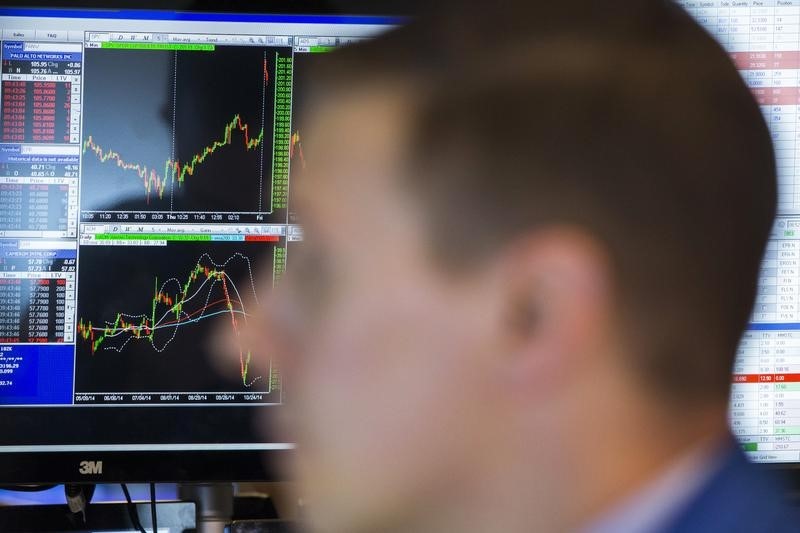* U.S. stock futures fall as much as 4.9%, Euro Stoxx 8.3%
* MSCI ACWI stock index down 19% from peak, on cusp of bear market
* Markets expect ECB to cut rates despite side-effects worries
* Fed futures fully price in 1% rate cut this month
* Safe-haven assets soar, but off recent highs
By Hideyuki Sano
TOKYO, March 12 (Reuters) - Financial markets reeled on Thursday as stocks dived and oil slumped after U.S. President Donald Trump took the dramatic step of banning travel from Europe to reduce the impact of the coronavirus, threatening more disruptions to trade and the world economy.
U.S. S&P 500 futures ESc1 plummeted as much as 4.9% and last traded down 3.6%, a day after the S&P 500 .SPX lost 4.89%, putting the index firmly in a bear market territory, defined as a 20% fall from a recent top.
Euro Stoxx 50 futures STXEc1 plunged 8.3% to their lowest levels since mid-2016. They were last down 6.9% while investors rushed to safe-haven assets from bonds to gold to the yen and the Swiss franc.
"The travel ban from Europe has definitely taken everyone by surprise," said Khoon Goh, head of Asia Research at ANZ in Singapore.
"Already we know the economic impact is significant, and with this additional measure on top it's just going to multiply the impact across businesses. This is something that markets had not factored in...it's a huge near-term economic cost."
In Asia, MSCI's broadest index of Asia-Pacific shares outside Japan .MIAPJ0000PUS fell 3.2% and touched its lowest level since early 2019, while Japan's Nikkei .N225 crumbled 5.3%.
Trump announced on Wednesday the United States will suspend all travel from Europe, except from the United Kingdom, to the United States for 30 days starting on Friday. However, Trump said trade will not be affected by the restrictions. also announced some other steps, including instructing the Treasury Department to defer tax payments for entities hit by the virus.
"For those who had been hoping for measures to offset likely fall in consumption, it was a disappointment," said Hirokazu Kabeya, chief global strategist at Daiwa Securities. "There was no talk of payroll tax cuts."
In the money market, traders further raised their expectations of an aggressive U.S. rate cut, underlining the fears in markets of a deepening economic downturn even as the Federal Reserve had stepped in last week with an emergency easing.
Fed fund rate futures 0#FF: are now pricing in a large possibility of a 1.0 percentage point cut, rather than 0.75 percentage point, at a policy review on March 17-18.
PANDEMIC
The World Health Organization (WHO) described the outbreak as a pandemic for the first time on Wednesday though an official said the move does not change the agency's response. highly infectious disease that virtually shut down most parts of China for much of February is spreading rapidly in Europe and increasingly in the United States, disrupting many corners of life from education to sports, entertainment and dining.
The U.S. National Basketball Association was the latest to be hit by the pandemic as it announced it will suspend the season until further notice. worry how much of an effect economic policies can have in turning around the global economy given the widespread restrictions on daily life, travel and disruptions to businesses.
A case in point was Britain, where the FTSE stock index .FTSE hit near four-year lows as investors doubted whether the $39 billion spending plan and the Bank of England's 0.5 percentage point rate cut announced on Wednesday would be enough to counter the shock from the outbreak.
The British pound stood at $1.2816 GBP=D4 , near this week's low.
"At this stage, we all need to take it on the chin and bear it for a few months (in terms of economic disruption)," said Cliff Tan, East Asian Head of Global Markets Research at MUFG Bank in Hong Kong.
"Here in Hong Kong and China we have been through it and know what's it like to shut down... I don't think the market has fully caught on with how this disruptive this could be for the economy."
Safe-haven assets were back in favour, though many of them were still below recent peaks, which some market players suspect reflects a desperate bout of profit-taking to make up for losses suffered elsewhere.
Gold XAU= edged up 0.1% at $1,636 per ounce but still stood well below Monday's high above $1,700.
The 10-year U.S. Treasuries yield fell 6 basis points to 0.760% US10YT=RR , though it is still more than 40 basis points above a record low of 0.318% touched on Monday.
The two-year yield US2YT=RR fell 6 basis points to 0.438%, but stood well above Monday's low of 0.251%.
In commodities, oil prices were hit by intensifying price war between Saudi Arabia and Russia, on top of fears of sharp slowdown in the global economy.
Saudi Arabia promised to raise oil output to a record high in its standoff with Russia.
The United Arab Emirates followed Saudi Arabia in promising to raise oil output to a record high in April. West Texas Intermediate (WTI) crude CLc1 shed 4.9% to $31.36 per barrel.
In the currency market, the dollar slid against the safe-haven yen and the Swiss franc.
The U.S. currency fell 1.0% to 103.48 yen and lost 0.5% to 0.9335 franc CHF= .
The euro traded at $1.1307 EUR= , up 0.35% ahead of the European Central Bank's policy meeting later in the day.
The ECB is all but certain to unveil new stimulus measures, including new, ultra-cheap loans for banks to pass onto small and medium-sized firms. have priced in a 10 basis point cut to its already record low minus 0.50% policy rate though many policymakers have said further cuts could be counterproductive because they hurt bank margins to the point of thwarting lending.
